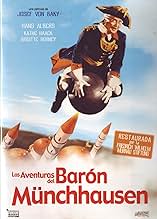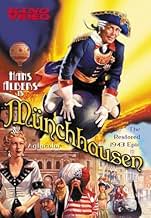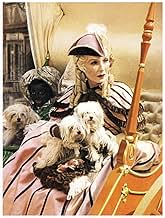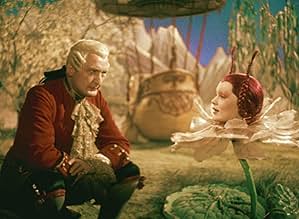Aggiungi una trama nella tua linguaThis lavish, impudent, adult fairy tale takes the viewer from 18th-century Braunschweig to St. Petersburg, Constantinople, Venice, and then to the moon using ingenious special effects, stunn... Leggi tuttoThis lavish, impudent, adult fairy tale takes the viewer from 18th-century Braunschweig to St. Petersburg, Constantinople, Venice, and then to the moon using ingenious special effects, stunning location shooting.This lavish, impudent, adult fairy tale takes the viewer from 18th-century Braunschweig to St. Petersburg, Constantinople, Venice, and then to the moon using ingenious special effects, stunning location shooting.
- Regia
- Sceneggiatura
- Star
- Premi
- 1 candidatura in totale
Recensioni in evidenza
Revisiting the movie now, as a euphemistically labeled "senior citizen," I was surprised that it holds up quite well. It amuses, it surprises, it is well acted, the dialog is clever, written after all by the famous novelist Erich Kästner under a pseudonym to cover up the fact that the Nazis saw themselves forced to employ him after burning his books.
There is something quite disturbing in hindsight about this movie. Why was it made? It was released in the year between the Battle of Stalingrad and the Allied Normandy Invasion the two events that were to seal Germany's fate. Was it an attempt to sustain both at home and abroad the far-fetched illusion that the war was going so well that all the German people cared about was laughing at the Baron Münchhausen's lies? Or was it an attempt at showing that Babelsberg could produce a grand spectacle just as well as Hollywood? And if a spectacle was being offered, why, in a country in which mass murder and deception were the order of the day, was even the hero to be a liar?
I am asking these questions because much in this movie is disturbing for reasons related to them. Take the Baron himself, played in this movie by Hans Albers, the greatest star, the Clark Gable of German movies in those years, yet by the time of this movie a man in his fifties pretending to be irresistible to females. It is as if MGM had cast an aging Adolphe Menjou as Rhett Butler in "Gone With the Wind." Now Albers is a fine actor, but to enjoy the movie you definitely have to suspend disbelief and pretend that the aging actor riding the cannonball is not bothered by arthritic pain.
The sets look more like cheap nouveau-riche furnishings and the costumes are cut from wartime stock. Ilse Werner, as Princess Isabella d'Este, is as beautiful as ever, and as Count Cagliostro we get to see Ferdinand Marian, the actor who just a few years earlier had disgraced himself by playing the lead in "Jud Süss," the most disgusting anti-Semitic propaganda film ever made, a fact that ultimately led Marian to alcoholism and a DUI death at war's end, considered a suicide by many.
Now, one can say, let's just watch the film for what it is, and not in its historic context. But then, Marian's acting of Cagliostro, a swindler, is crafted with the same mannerisms he used in creating the Jew Süss. In short, the undeniable artistic qualities of this movie are infected with the severe moral deficiencies of its makers, and this surprisingly renders the movie more interesting than it has any right of being. This is what disturbs me.
For being made right in the middle of WWII, this is an obscenely expensive - circa $35 million in today's currency - spectacle (given pretty much carte blanche, the producers went overschedule and overbudget) commissioned by the Nazis - but scripted, ironically, by a Jew - on the occasion of the 25th anniversary of Germany's foremost film unit, UFA, it was also seen as a direct response to such foreign-made extravaganzas as Hollywood's THE WIZARD OF OZ (1939) and Britain's THE THIEF OF BAGDAD (1940)! The character of the tale-spinning Baron Munchausen originated in a book by 18th century author Gottfried August Burger which, along the years, has inspired 4 feature-film adaptations (as well as a Silent short by pioneering wizard Georges Melies and an animated short that was thankfully included on the Kino DVD and which will be discussed separately). Despite the stature accorded the 1988 Terry Gilliam version THE ADVENTURES OF BARON MUNCHAUSEN (which I watched only once several years ago and recall being a somewhat hit-or-miss affair), the 1943 film emerges as perhaps the most satisfying cinematic rendition overall.
The film is book-ended by scenes with a contemporary i.e. 1940s setting, in which the Baron (played as a dashing yet cunning womanizer rather than the Quixotic fool envisioned by Terry Gilliam) recounts some of his adventures - in the third person - to a naïve young couple (the female member of which had fallen under his spell at a fancy-dress ball). The rest is an episodic fantasia in which Munchausen - usually driven by the promise of a romance and accompanied by his faithful sidekick - journeys from one country to the other (meeting along the way historical historical figures like Czarina Catherine The Great, Giacomo Casanova and the magician Cagliostro, who endows him with both immortality and the power of invisibility, as well as purely invented characters such as the self-proclaimed "world's fastest runner") until he ends up on the moon itself. Quality varies but the end result, as a whole, is a delight and a veritable feast for the eyes (thanks, in no small measure to the highly pleasing Agfacolor, the splendid production design and the charmingly primitive special effects).
Still, one thing that bothered me about the DVD was the fact that the subtitles barely allowed one time to read them (in all fairness, this had a lot to do with the virtually uninterrupted flurry of the film's dialogue itself - hence, something other than a thin white font should have been adopted)! The extras were more extensive than I had anticipated and up to Kino's standards for a "Special Edition" release - the best, however, was the 17-minute interview with the head of the German archival company that handled the current restoration, which goes into some detail about this as well as the production of the film itself.
DIE ABENTEUER DES BARON MUNCHHAUSEN - EINE WINTERREISE (Hans Held, 1944) **1/2 {6/10}: A pleasant animated short from Germany about the popular title character, made in color but containing no dialogue; it came hot on the heels of the 1943 epic film version - though the latter, apparently, left no recognizable impression on it (as the Baron here looked and acted nothing like the part as played by Hans Albers, nor was the plot 'lifted' from some particular sketch in the episodic film). In fact, the short presents only a couple of incidents (presumably taken from the book which inspired the film version in the first place, and several others made before and after it): one in which the Baron's horse ends up dangling in the air from the façade of a building (seen in the front-cover illustration of the book from which Albers reads during the modern sequences in the film, though the episode itself is not re-enacted) and then when the two of them are chased by a hungry wolf in the snow, with the latter proceeding to swallow the horse in one gulp and replaces it in leading the Baron's sled!
Acclaimed director Terry Gilliam of Monty Python and 12 Monkey's fame, obviously tried to draw more attention to this striking wonder when he made his own version of this tale 'The Adventures Of Baron Munchausen' in 1988. If it wasn't for Mr.Gilliam, I probably would have never bothered to even watch this film. So I owe him many thanks as Münchhausen has easily become one of my all time favorite films. The pace, humour, and sheer originality of this fantasy make it one of the easiest subtitled films to watch in existence, period. It ranks up there with the greatest pre-1950's films such as The Treasure Of The Sierra Madre, and Chaplin's brilliant City Lights. If you love movies, if you love classic cinema, if you love original fantasy films, if you love humorous films; Seek out 1943's Münchhausen whatever you do. It will not disappoint. This film is certainly not for children. However, in terms of flat out fantasy entertainment, I would say that this nearly 70 year old antique blows away Peter Jackson's Lord Of The Rings films any day, and easily. Enough said.
9/10
At the height of World War Two, as the tide was beginning to turn against the Third Reich, Hitler's Minister of Propaganda, Joseph Goebbels commissioned this lavish motion picture as a commemoration of the 25th anniversary of Ufa, the government-run German film association. More importantly, it was also to be a rival of the great fantasy films which had come from the Allied nations, such as THE WIZARD OF OZ (1939) and THE THIEF OF BAGDAD (1940). In that it succeeds brilliantly and needs no comparison to any other film.
The film is a great, lighthearted romp as it follows the adventures of the Baron from Prussia to St. Petersburg, Constantinople, Venice and even the Moon. It is fascinating to see the high quality which the Germans were still able to lavish on the picture, even as their Empire was beginning to crumble around them. The production values are of a very high order and the Technicolor photography is sumptuous to the eye. Remarkably, there is no National Socialist propaganda in the film and the War is never mentioned.
In the title role, Hans Albers gives a surprisingly sensitive performance for such a robust production. He takes the legendary character and gives the viewer a portrait of a dashing, reflective, amorous, compassionate, resourceful man. Whether riding on a cannonball, ingratiating himself with the Ottoman Sultan, or examining the fantastic flora of the lunar planet, Albers always makes Münchhausen totally believable.
All the acting is of a high order, but especially worthy of mention are Ferdinand Marian as the mysterious Count Cagliostro, Brigitte Horney as a flirtatious Catherine the Great, and Gustav Waldau as an aging Casanova.
It should be mentioned that this is not a movie for children. Given its European origins it should come as no surprise that MÜNCHHAUSEN is a good deal more libidinous than the standard Hollywood fare of the time.
**************************
There was a real Baron Karl Friedrich Hieronymus von Münchhausen (1720-1797), a German adventurer and teller of tall tales, but he had nothing to do with the book of fictional exploits which borrowed his name, written by Rudolf Erich Raspe (1737-1794), upon which this film was based.
Lo sapevi?
- QuizWriter Erich Kästner is widely reported to be billed as "Berthold Bürger" on this film, but there is in fact no writing credit at all. Kästner was a banned author in Nazi Germany and his books were among those burnt in 1933, which was the reason for the lack of writing credit here. Joseph Goebbels gave Kästner only a special permission to write a script, on which the author was actually named as Berthold Bürger. However he also give instruction to the German press never to mention the real author of the script nor to mention the name Berthold Bürger. Therefore no writing credits in the movie was used.
- BlooperSophia's "beauty spots" disappear and reappear during the opening scenes of the film.
- Citazioni
Doge: I'm glad the balloon is to launch in Venice -- it will advance the cause of science, and provide entertainment for the people. The art of the statesman is, by doing one thing, to achieve two goals.
François Blanchard: I serve only science, your Excellency.
Doge: Of course, it's best for you to believe that. Let no one convince you otherwise.
- Versioni alternativeThe length of this film when submitted to the Film Review Office in March 1943, according to the Deutsches Filminstitut, was originally 134 minutes (or 3662 meters). This version was used for the premiere of the film at the Ufa-Palast am Zoo. Three months later, a second version (the general release version) was submitted, cut down to 118 minutes (3225 meters). After the war, the next version (December 1949) was 105 minutes, the 1954 version 101 minutes, the version for general audiences (shown that year) 88 minutes. In 1995, a first restoration was assembled by the F.W. Murnau Foundation, clocking in at 114 minutes. In 2017, a 35mm Agfacolor print was discovered at the Gosfilmofond of Russia. That print, which runs 131m (3590m), was restored and used for the 2019 Blu-ray release.
- ConnessioniFeatured in ...e l'Inghilterra sarà distrutta (1967)
I più visti
- How long is The Adventures of Baron Munchausen?Powered by Alexa
Dettagli
- Data di uscita
- Paese di origine
- Lingua
- Celebre anche come
- The Adventures of Baron Munchausen
- Luoghi delle riprese
- Berlino, Germania(environs)
- Azienda produttrice
- Vedi altri crediti dell’azienda su IMDbPro
- Tempo di esecuzione1 ora 50 minuti
- Mix di suoni
- Proporzioni
- 1.37 : 1
Contribuisci a questa pagina


































